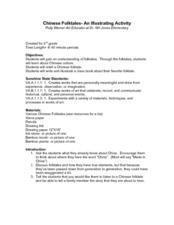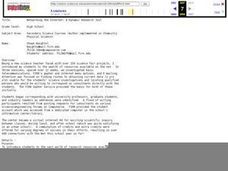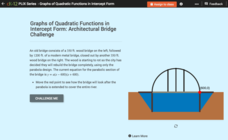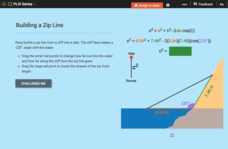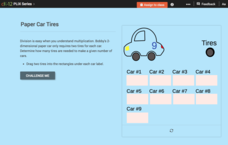Curated OER
George Washington Crossing the Delaware: A Study of Setting and Character
Young scholars examine "Washington Crossing the Delaware." In this American Revolution lesson, students analyze the painting, research its background, and then perform skits based on their findings.
Hawaiʻi State Department of Education
Dance Critic
What do writing and dance have in common? They both have a six-trait rubric for assessment. Just like a good story, a good dance must have a hook, beginning, middle, end, logical sequence, and a climax. Learners use a...
Curated OER
Animal Self-portrait Mosaics: A Visual Arts Elective
Out-lined here is a two-week procedure that has the class creating ceramic animal tiles that are metaphorical representations of their own personalities. They discuss animal images found throughout history, what they mean, metaphor, and...
Curated OER
Comparing Cinderella and The Rough-Face Girl
Pupils examine similarities and differences between cultures. They'll see that literature, reading, and story telling is something all cultures have in common. They should construct Venn diagrams to help them compare and contrast the...
Education World
Edible Resource Maps!
Young scholars discuss resource maps and examine examples from library resources. Working in groups, they create edible resource maps by drawing examples, such as popcorn on the border of Iowa and Nebraska. Then they use cookies in the...
Curated OER
Antonyms, synonyms and homophones
Shed light on what antonyms, synonyms, and homophones are. In this lesson plan, upper elementary schoolers create pairs using an antonym, a homophone, and/or a synonym. Then they play an antonym matching game.
Curated OER
Plagiarism
Don't get caught plagiarizing! Before starting your research unit, use this lesson to help your young writers identify plagiarism. The truth is, many kids don't even realize when they're doing it! They practice citing sources when...
Curated OER
Chinese Folktales: An Illustrating Activity
In need of a really good lesson that incorporates literature, art, and cultural themes? After hearing a traditional Chinese folktale and discussing cultural themes and symbolism, learners create original illustrations for the story. This...
Curated OER
Coming Full Circle
Students develop and design their own clothing line in this Visual Arts lesson plan about the intricacies of the fashion world. Emphasis is placed upon current and vintage designs, famous designers, and the development of individual...
Curated OER
Networking the Internet: A Dynamic Research Tool
Students engage in a activity that is concerned with the research of finding information to help them develop new science projects. They conduct research using a variety of resources that includes e-mail and discussion groups.
Curated OER
The Daily Idiom
What is an idiom? Learners identify and read common idioms. They discuss what idioms are, and are given a black line master embedded in the plan that has 100 common idioms. Next, they complete "The Daily Idiom" worksheet, which is...
Curated OER
Reptiles and Amphibians
Introduce your class to various reptiles and amphibians. They will meet and identify a representative from each of the four major reptile families, then learn about and discuss reptile characteristics. Next, they will identify and...
University of Georgia
Land Biomes Project
Challenge scholars to research a biome and create a presentation for the producers of Survivor to choose their ecosystem for the next season's show. The materials include outlines, worksheets, and grading rubrics for individuals as well...
CK-12 Foundation
Exponent Properties with Variable Expressions: Size of Solar Tornadoes
Exponents may have your pupils' heads spinning after an engaging lesson as they connect properties to tornadoes! Learners compare a distance between cities to the distance across a solar tornado. They use exponent properties to find the...
CK-12 Foundation
Graphs of Quadratic Functions in Intercept Form: Architectural Bridge Challenge
There are architectural parabolas all around us! A creative lesson analyzes the architecture of a parabolic bridge. Learners must manipulate the bridge to satisfy given criteria and then answer questions about the dimensions of the...
CK-12 Foundation
Multiplying Matrices by a Scalar
The rule is add before multiplying, even with matrices. Pupils use a slider to change the scalar multiplying the sum of two matrices. The interactive displays the resulting solution matrix, and requires scholars answer five questions...
CK-12 Foundation
Rectangular to Polar Form for Equations: Polar Coordinates
Plot points around a wheel. Pupils use an interactive tool to plot a point using polar coordinates with the aid of a wheel. Scholars use the interactive to answer five questions to finish the lesson. The resource provides background...
CK-12 Foundation
Negative Exponents
Watch the exponent expression do the negative exponent dance! An interactive lesson uses an animation to show how negative exponents become positive. Learners manipulate the expression and then respond to conceptual questions.
CK-12 Foundation
Law of Cosines: Building a Zip Line
Zip this resource into your lesson plans. Here is an interactive that shows how angles and lengths change based on conditions for a zip line. Scholars use the Law of Cosines to solve problems in this context.
CK-12 Foundation
Topographic and Geologic Maps: Topographic Maps
Maps are great for helping you get where you're going, but what does that place actually look like? Geology scholars compare and contrast the features of topographical and geologic maps using an interactive lesson. The resource describes...
CK-12 Foundation
Microscopes: Focal Point
The 1590s saw the invention of the first compound microscope. Scholars learn about how microscopes work and how to properly focus one. The lesson stresses the science fields that use microscopes and the difference between electron...
CK-12 Foundation
Single Variable Division Equations: Paper Car Tires
Don't tire of solving equations, mix up your lesson! A virtual interactive has users drag paper tires to toy cars. Solving a one-step equation lets them find how many cars can be made from a given number of tires.
CK-12 Foundation
Complementary Angles
Here's an interactive that complements your lesson plans. Users of the resource adjust one of the angles in a complementary set to see how it affects the other. A set of challenge questions assesses understanding.
CK-12 Foundation
Linear Pairs
Pair up this resource with a lesson on linear pairs. Scholars solve for missing variables and values of angles in linear pairs. They use an interactive to help with this endeavor.







